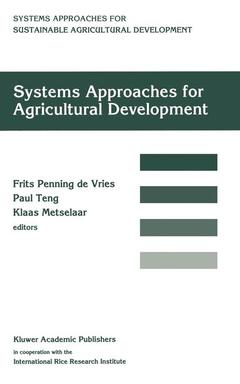Description
Systems approaches for agricultural development, 1993
Proceedings of the International Symposium on Systems Approaches for Agricultural Development, 2–6 December 1991, Bangkok, Thailand
System Approaches for Sustainable Agricultural Development Series, Vol. 2
Coordinators: Penning de Vries F.W.T, Teng P.S., Metselaar Klaas
Language: English
Subjects for Systems approaches for agricultural development:
Publication date: 11-2013
543 p. · 15.5x23.5 cm · Paperback
543 p. · 15.5x23.5 cm · Paperback
Description
/li>Contents
/li>
Agriculture is changing rapidly all over the world. Intensification, diversification, optimizing scarce resources, integrated pest management, sustainability and climate change are key issues for agricultural institutes. The best solutions will be found by integrating disciplines. Organized thinking about future farming requires forecasting of the implications of alternative ways to farm and to develop agriculture. Systems thinking and systems simulation are indispensable tools for such integration and extrapolation. About 150 scientists and senior research leaders from all over the world participated in the symposium `Systems Approaches for Agricultural Development' to discuss these issues. The symposium reviewed the status of systems research and modeling in agriculture, with special reference to evaluating their efficacy and efficiency for achieving research goals, and to their application in developing countries, promoted international cooperation in modeling, and increased awareness of systems research and simulation.
This book comprises the papers on the technical subjects. Well informed authors describe and illustrate how systems research was used to improve agricultural production systems of all continents and in diverse environments.
This book comprises the papers on the technical subjects. Well informed authors describe and illustrate how systems research was used to improve agricultural production systems of all continents and in diverse environments.
Session 1. Crop Production: Genotypic Constraints.- Designing improved plant types: a breeder’s viewpoint.- Improvement of rice plant type concepts: systems research enables interaction of physiology and breeding.- Designing improved plant types for the semiarid tropics: agronomists ‘viewpoints.- Simulation in pre-testing of rice genotypes in Tamil Nadu.- Genetic specific data for crop modeling.- Session 2. Crop Production: Weather Constraints.- Agro-ecological zoning using crop growth simulation models: characterization of wheat environments of India.- An agroclimatic approach to agricultural development in India.- Optimising harvest operations against weather risk.- The impacts of climate change on rice yield: evaluation of the efficacity of different modeling approaches.- Rice production and climate change.- Session 3. Crop Production: Soll Constraints.- A systems approach to the assessment and improvement of water use efficiency in the North China Plain.- Soil data for crop-soil models.- Root ventilation, rhizosphere modification, and nutrient uptake by rice.- Adjustment of nitrogen inputs in response to a seasonal forecast in a region of high climatic risk.- Maize modeling in Malawi: a tool for soil fertility research and development.- Session 4. Crop Production: Biological Constraints.- Pest damage relations at the field level.- Quantification of components contributing to rate-reducing resistance in a plant virus pathosystem.- The rice leaf blast simulation model ‘Epiblast’.- Session 5. Farming Systems.- Potential for systems simulation in farming systems research?.- Making farming systems a more objective and quantitative research tool.- Options for agricultural development: a new quantitative approach.- Options for agricultural development: a case studyfor Mali’s fifth Region.- Multicriteria optimization for a sustainable agriculture.- Simulation of multiple cropping systems with CropSys.- Optimization of cropping patterns in tank irrigation systems in Tamil Nadu,lndia.- Agricultural development in Thailand.- A methodological framework to explore long-term options for land use.- Session 6. Education, Training And Technology Transfer.- Decision support systems for agricultural development.- Constraints in technology transfer: a user’s perspective with a focus on IPM, Philippines.- Postgraduate education in agricultural systems: the AIT experience.- The IBSNAT project.- Building capacity for systems research at national agricultural research centres: SARP’s experience.
© 2024 LAVOISIER S.A.S.




